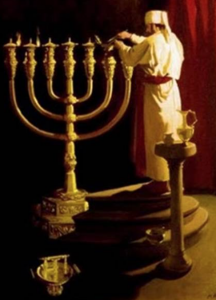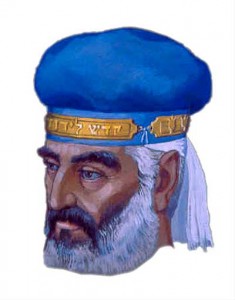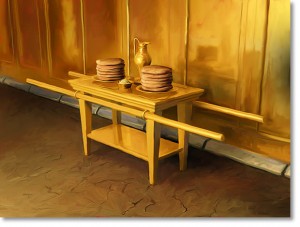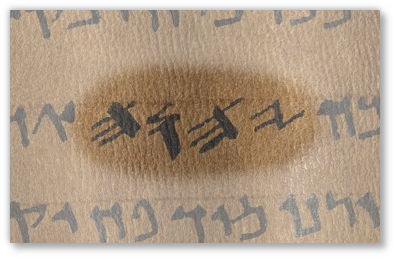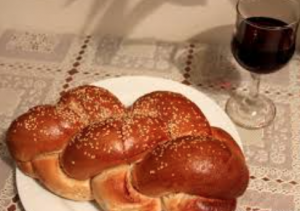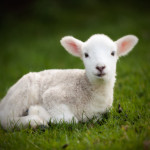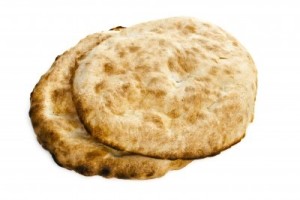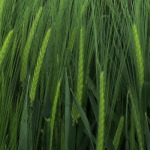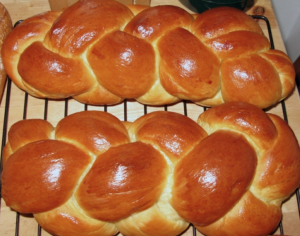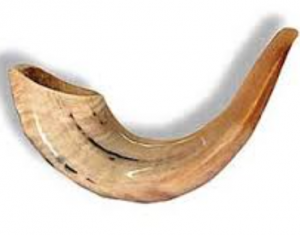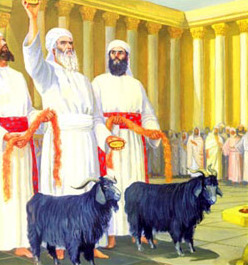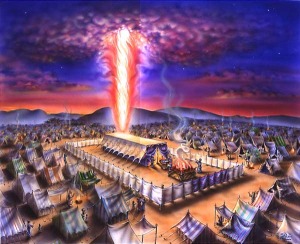אמור
Parshat Emor
Wayyiqra (Leviticus) 21:1-24:23

And YaHuWaH said to Mosheh, “Speak to the priests, the sons of Aharon, and say to them: ‘No one is to be defiled for the dead among his people- Wayyiqra (Leviticus) 21:1
The sons of Aharon were chosen above all the clan of the Lewites. Lewi (Levi) is but one of twelve tribes, who were sons of the patriarch Yaacob (Jacob), who was renamed Yashar’el (Yisrael). This Torah portion is called אמור “Emor” (Amor) and means, “speak”. YaHuWaH said to Mushah, “emor el hakohanim benei Aharon”, or speak to the Kohanim, the sons of Aharon. The Kohanim, sons of Aharon are called to the highest standards of Qodeshah (Set Apartness). The Kohan is not allowed to defile himself by coming near the corpse of a relative unless it is his son, daughter, mother, father, wife, brother or for his virgin sister. He is also forbidden to marry a woman who is a harlot, one who is profane or has been divorced. YaHuWaH actually repeats this point and further states that the Kohan can only marry a virgin! The Kohanim (Priests) were to be the model and example to the entire nation.
Wayyiqra (Leviticus) 21:4‘A leader does not defile himself among his people, to profane himself;5 they do not make any bald place on their heads, and they do not shave the corner of their beard, and they do not make a cutting in their flesh.6 ‘They are set-apart to their Elohim and do not profane the Name of their Elohim, for they bring the offerings of YaHuWaH made by fire, and the bread of their Elohim, and shall be set-apart.
Contrary to pagan priests who typically made bald places on their heads and printed marks an engraved cuttings in their flesh, the Kohenim of YaHuWaH were Qodesh. They wore their beards without shaving them or damaging them, they did not make bald patches in their heads.
Just as the Kohanim, sons of Aharon are called to the highest standards of Qodeshah (Set Apartness), so are leaders and elders of the people. If the daughter of the Kohanim sells herself as a harlot to profane her father she is to be executed.
Wayyiqra (Leviticus) 21:10‘And the high priest among his brothers, on whose head the anointing oil was poured and who is ordained to wear the garments, does not unbind his head nor tear his garments,11 nor come near any dead body, nor defile himself for his father or his mother,12nor go out of the set-apart place, nor profane the set-apart place of his Elohim, for the sign of dedication of the anointing oil of his Elohim is upon him. I am YaHuWaH.
Contrary to western culture, to unbind the head was a sign of morning or distress. The Kohen who is Mashcah (Anointed) was not allowed to remove his turban or tear his garments as an act of morning or for any other purpose. When he is in service he may not decide to leave the Qodesh place for any reason before completing his tasks.
If a Kohen has a defect he cannot serve in the Miqdash (Sanctuary), if he is blind, lame, disfigured or deformed he may not approach. The Torah goes on to list that a man who has a broken hand or foot, a hunchback, dwarf, a man with a defect in the eye, eczema, scab, or eunuch cannot come before YaHuWaH to serve in the Miqdash. A man with a defect, of the Kohanim cannot bring the offerings made by fire to YaHuWaH, he cannot bring the bread of his mighty one. Though he may not approach the altar or veil of the Miqdash (Sanctuary) he does eat the bread of his Elohim (Aluahym) both the qodesh and most qodesh bread. Animals sacrificed to YaHuWaH must also be without defect or deformity.
Wayyiqra (Leviticus) 22:2“Speak to Aharon and his sons, that they separate themselves from the set- apart offerings of the children of Yashar’al (Yisrael), and that they do not profane My set-apart Name in what they set apart to Me. I am YaHuWaH.3 “Say to them, ‘Any man of all your offspring throughout your generations who draws near the set-apart offerings which the children of Yisrael set apart to YaHuWaH, while he has uncleanness upon him, that being shall be cut off from before Me. I am YaHuWaH.
They are commanded further not to eat of the Qodesh food while being in a state of uncleanliness. This uncleanliness included, the leper or one whom has a discharge of fluid. If one is unclean for any reason, he cannot eat of the qodesh food until he is clean (tahor).
YaHuWaH also commanded:
Wayyiqra (Leviticus) 22:27“When a bull or a sheep or a goat is born, it shall be seven days with its mother. And from the eighth day and thereafter it is acceptable as an offering made by fire to YaHuWaH. 28 “But do not slaughter a cow or a sheep and its young on the same day.
We are also commanded to make the Name of YaHuWaH Qodesh (sanctified/ set apart) and not profane his Name!
Moedim (Appointed Times)
“Speak to the children of Yisra’Ãl, and say to them, ‘The appointed times of YaHuWaH, which you are to proclaim as set- apart gatherings, My appointed times, are these:
Shabbath-“Six days shall work be done. But the seventh day is Shabbath of rest a qodesh gathering, you shall do no work: it is a shabbath to YaHuWaH in all your dwellings….
Pesach-On the fourteenth day of the first month towards evening is YaHuWaH’s Passover. On the fifteenth day of the same month is the Feast of Matzot to YaHuWaH: seven days you shall eat unleavened bread.
Matzoth– And on the fifteenth day of this month is the Festival of Unleavened Bread to YaHuWaH – seven days you eat unleavened bread.‘On the first day you have a set-apart gathering, you do no servile work.
Resheit Katzir– ‘And he shall wave the sheaf before YaHuWaH, for your acceptance. On the morrow after the Sabbath the priest waves it.
Shabuot (Shavuot)-‘And from the morrow after the Sabbath, from the day that you brought the sheaf of the wave offering, you shall count for yourselves: seven completed Sabbaths.‘Until the morrow after the seventh Sabbath you count fifty days, then you shall bring a new grain offering to YaHuWaH. ‘Bring from your dwellings for a wave offering two loaves of bread, of two-tenths of an Ephah of fine flour they are, baked with leaven, first-fruits to YaHuWaH
Yom Teruah– ‘In the seventh month, on the first day of the month, you have a rest, a remembrance of blowing of trumpets, a set-apart gathering. ‘You do no servile work, and you shall bring an offering made by fire to YaHuWaH”
Yom Kippur– “On the tenth day of this seventh month is the Day of Atonement. It shall be a set- apart gathering for you. And you shall afflict your beings, and shall bring an offering made by fire to YaHuWaH. “And you do no work on that same day, for it is the Day of Atonement, to make atonement for you before YaHuWaH your Elohim.
Sukkot– The first day shall be a sabbath, and on the eighth day shall be a sabbath.
‘And you shall take for yourselves on the first day the fruit of good trees, branches of palm trees, twigs of leafy trees, and willows of the stream, and shall rejoice before YaHuWaH your Elohim for seven days.
‘Dwell in booths for seven days; all who are native Yisra’elites dwell in booths,
Further YaHuWaH describes that the light of the menorah must stay lit and new oil added each morning. He also describes the way the bread should be arranged on his table ever Shabbath.
The son of an Yisraelite woman, whose father was an Mitsirit, went out among the children of Yashar’al. This son of an Yisraelite woman, and a man of Yashar’al, strove together in the camp.
The Yisraelite woman’s son blasphemed the name of YaHuWaH and cursed; they brought him to Mosheh. His mother’s name was Shelomit, the daughter of Dibri, of the tribe of Dan. They put him in custody, for [his penalty] to be specified by the mouth of YaHuWaH.
YaHuWaH spoke to Mosheh, saying, “Bring forth him that has cursed outside the camp… and all the congregation shall stone him.”
YaHuWaH commands that one who murders shall face the death penalty. Anyone who injures a fellow, or kills an animal, must make monetary restitution.
The Kohanim (Priests) are models of what our spiritual life should be. We are called to Qodeshah and to be set apart to YaHuWaH. We have been called to make a distinction between clean and unclean. We are called to make time Qodesh as well. Yahuwshuwa the Messiah fulfilled the first four of the appointed times in his death, burial and resurrection, also sending the Ruwach (wind/spirit) on Shabuot. He will fullfill the final three appointed times at his return! Let us prepare and be Qodesh!


